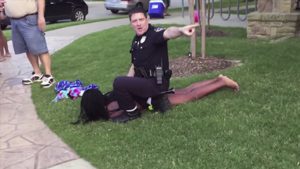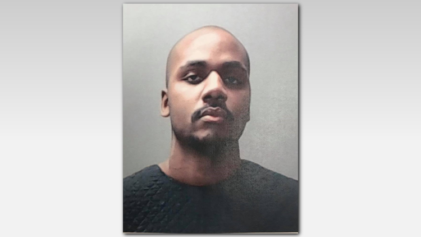
Sandra Bland
The pervasive racial stereotypes of Black women — as being angry, of having an attitude, and other unflattering characteristics — are deeply rooted in slavery. And these stereotypes continue to do harm to Black women and girls, in terms of policies and practices that punish them.
Last week, Geneva Reed-Veal, the mother of Sandra Bland, spoke at a symposium held by the newly formed Congressional Caucus on Black Women and Girls. Bland, who was arrested at a traffic stop, was found dead in a Texas jail cell in July 2015. In her speech, Reed-Veal said her daughter did not commit suicide, and she spoke of the other Black women who died in jail cells throughout the nation the same month Bland lost her life:
I will continue to speak for every mother paralyzed because of the loss of their child. Six, and Google them. I’m looking at your phones. Take two minutes and Google the other six that died in jail. We’re not talking about that year, we’re talking about the month of July. 18-50 [years old]. Kindra Chapman allegedly stole a cell phone; 20 hours later she hung herself. Alexis McGovern downstairs in the infirmary dead, her family upstairs paying the bond. Nobody has spoken these names. And as I go around the country speaking, the fact that no pen is raised in a room, where six other women, aside from my daughter, have died. And nobody knows their names. That’s a problem.
Meanwhile, as Black women are found dead in jail cells, young Black girls are manhandled and fondled by hulking white men in police uniforms — whether in Spring Valley High School in Columbia, S.C., or at a McKinney, Texas pool party. There are no white Sandra Blands, as experts contend this type of treatment is reserved for Black women and girls, who never were viewed by this society as possessing the humanity associated with white women.

McKinney, Texas pool party, 2015
“I think there is a larger literature of examining the stereotype of the angry Black woman that really reminds us that this is rooted in the stereotypes of our slave past that reduced our Black women to oversexualized stereotypes,” Dr. Blair LM Kelley, Assistant Dean for Interdisciplinary Studies and International Programs and Associate Professor of History at North Carolina State University, told Atlanta Black Star.
“The mammy stereotype — the comforting figure who doesn’t care for her own but for others in a selfless fashion. The irrational Sapphire stereotype from the era of minstrelcy. It is amazing how we cannot get beyond those assumptions, the way those stereotypes from the era of minstrelcy shape how people see us, even when they do not know about those stereotypes,” Kelley added, referring to the “political residue of history” that causes people to “fail to see people as human and put them in boxes.”
According to Kelley, “racism is the water we swim in, and so all of us as Americans take on these assumptions, so that Black people are assuming Black women’s anger is not justifiable.”
Black people, she said, “fall victim to the twisted ways people view them, in a society that is so tilted towards these assumptions.” Minstrelcy, in the tradition of “Amos ‘n’ Andy,” is so deeply ingrained in American culture that people do not even realize it, she concludes, “and we all fall victim to it.”
Dr. Carolyn West, Associate Professor of Psychology at the University of Washington, told Atlanta Black Star that these issues are not simple.
“Certainly, it’s complicated for sure. We have the legal system and everything in this as well, and a long history behind all of this imagery, so this makes it much more complicated” said West, the author of “Violence in the Lives of Black Women: Battered, Black, and Blue” and “Mammy, Jezebel, Sapphire, and their homegirls: Developing an ‘oppositional gaze’ toward the images of Black women.” In her writings, which come from a Black feminist perspective, West explores the intersection of various forms of oppression that shape Black women’s lives.
“We don’t know how to deal with Black women’s justifiable anger. Often we see Black women’s anger depicted in a humorous situation, like Tyler Perry,” she suggested. “Often Black women’s anger is couched in humor, which makes it easier to not take it seriously.”
West noted that even when Black women are not acting out in an angry manner, they are perceived as angry nonetheless. This places Black women in a double bind, she says.
“Your anger is seen as dangerous and out of control,” West said of the white perception of Black women, suggesting there is no way around it. “These images are just inescapable, and it’s really about other people’s projections, so people can’t see you as an individual. And I don’t know how you escape that.”
Like Kelley, West believes these racial attitudes are longstanding.
“It’s a continuation of what has always happened in this country. Black women were not seen as feminine or effeminate, and not worthy of that protection, so it is nothing new or unique,” she said. “We need to have a conversation about that within the African-American community as well. It is easy to be outraged when white officers or the legal system does this. It is easier to be outraged about violence against the Black community than within the Black community, particularly when it is gender based,” she argued.
In addition, West expressed concern over the zero-tolerance policies that ensnare so many Black girls.
“You’re talking back, so we’re dealing with it by removing you from school … and even if you’re not talking back the system still mobilizes against you,” she said.
The professor made reference to the pummeling of a Black teenage girl at Spring Valley High School by a police officer in 2015. The girl, Shakara, was reportedly looking at her cellphone.
“And she wasn’t even saying anything — even if you are not really talking back I don’t think you can escape those stereotypes or the idea that you’re aggressive,” she noted.

Assault at Spring Valley High School
Further, Kelley noted that Shakara, who was recently orphaned and placed in foster care, had not hit anyone, yet was treated as if she had.
“Her cellphone was one of her few lifelines,” she said of the girl, who was arrested for resisting authority.
In a new book called “Pushout: The Criminalization of Black Girls in Schools,” author Monique W. Morris sheds light on the discrimination which Black girls and women experience. While only 16 percent of female students, Black girls are over one-third of girls who are arrested in school. Black girls are misunderstood and criminalized by school administrators who are not sensitive to their needs, she argues. Past studies have outlined the risks faced by Black girls, who are over-disciplined and six times more likely to be suspended than white girls due to racial stereotyping and gender-based punishments. After all, Black girls are described as untrustworthy, “ignorant,” “ghetto,” “loud” and “rowdy.”
The media play a role in perpetuating these stereotypes. Take, for example, “the consumption of these Worldstar videos, where Black girls and Black women are fighting one another and being violent toward one another, and there are people, including Black men and women cheering them,” Kelley noted.
Meanwhile, West pointed a finger at reality TV, where “all of a sudden Black women go from 0 to 100 and snatch off each other’s weaves. This is entertainment and encouraged in a way that is disconcerting,” she offered. “We’re surrounded by these images, and when you don’t see yourself in ways that are healthy, it can really be internally dysfunctional.”
West is thankful for Shonda Rhimes and a range of Black writers who create complex Black characters that are “justifiably mad, they are not Sapphires or subhuman” and are allowed a range of emotions and their full humanity.
Nonetheless, we cannot escape the fact that in America, Black women such as Bland continue to lose their lives.
“The concern comes when the moment of a Sandra Bland happens, and so many young women and girls are killed and are not seen as vulnerable women who deserve respect and accordance of their rights as citizens,” Kelley said. “You are saddened when those quick assumptions have consequences.”
Part of the dehumanization of Black people such as Bland is the victim blaming, insisting that the victim was responsible for her own killing, and but for her failure to obey authority and comply with the officer’s demands, she would be alive today. Kelley rejects this line of reasoning, noting that during segregation, Black folks did a good job of complying with orders, when their lives were dependent upon the whims of whites.
“We were complying very well, and yet that was the height of violence against African-Americans,” she noted. “You can behave your way out of racial terror. We want everyone to behave…but we also don’t want hyper situations that are not in accord with what is happening.”
The answer, Kelley believes, is a conscious effort to show respect and humanity for everyone.
“There are so many ways we are not looking out for the human rights of people,” she said, adding that it is incumbent upon law enforcement to see humanity in the people with whom they are dealing, to empathize even with people who are allegedly committing a crime or violation.
“Law enforcement should be able to deal with people who are not quite at their best and still be quite respectful, and secure the situation once they know they are not in danger,” she said.
Kelley used the example of the biker shootout in Waco, Texas, in which white biker gang members — though they were murder suspects emerging from a bloodbath — were treated with respect and were spared handcuffs behind their backs. Yet, Bland was stopped for not having blinkers, which is a minor offense, and she should not have been stopped at all. Kelley attributes this to “residues of slavery” and a dehumanization that creates an inability to view oneself in another person’s shoes.
“Seeing Black people who deserve respect, dignity and patience is not a huge stretch.”
Black women, such as the founders of the Black Lives Matter movement, she believes, need to help change these conditions.
West also addressed the issue of mental health and Black women, as those who disproportionately find themselves in the legal system need mental health counseling. These people will find their mental health issues exacerbated by the system, and if they did not have any going in, they stand to have these on their way out.


